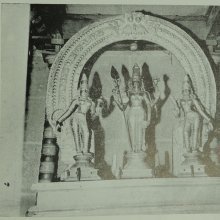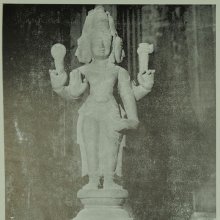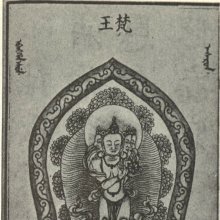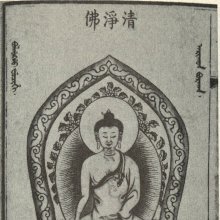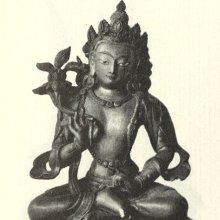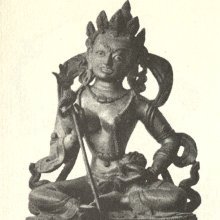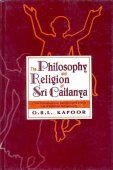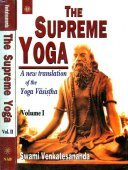Brahman: 26 definitions
Introduction:
Brahman means something in Buddhism, Pali, Hinduism, Sanskrit, the history of ancient India, Hindi. If you want to know the exact meaning, history, etymology or English translation of this term then check out the descriptions on this page. Add your comment or reference to a book if you want to contribute to this summary article.
Images (photo gallery)
(+11 more images available)
In Hinduism
Pancaratra (worship of Nārāyaṇa)
Source: SriMatham: Vaiṣṇava Iconology based on Pañcarātra ĀgamaThe word ‘Brahman’used in the Upaṇiṣads is derived from the root bṛh which means ‘to expand’ or ‘to grow’ and as such indicates that Immensity which includes everything which is conceivable.
The Vedas declare—
sarvam khalvidam brahma—
‘all this is Brahman’.
This Immensity Brahman is beyond the comprehension of any being.Out of this transcendental Being there issues forth the first form of Godhead known as the Para-Vāsudeva in a subtle form with twoarms, crystal in complexion and clad in yellow garments. This form is identified also as Nārāyaṇa (which means “the ground of all being”). In the Pañcarātra, Paramātman, Nārāyaṇa, Viṣṇu, Bhagavān and Vāsudeva are the various names by which Brahman the Supreme is known.

Pancaratra (पाञ्चरात्र, pāñcarātra) represents a tradition of Hinduism where Narayana is revered and worshipped. Closeley related to Vaishnavism, the Pancaratra literature includes various Agamas and tantras incorporating many Vaishnava philosophies.
Purana and Itihasa (epic history)
Source: archive.org: Shiva Purana - English TranslationBrahman (ब्रह्मन्) is used as an epithet for Śiva, according to the Śivapurāṇa 2.2.41.—Accordingly, as Viṣṇu and others eulogized Śiva:—“[...] obeisance to Vāma, Vāmarūpa, Vāmanetra, Aghora, the great lord and the Vikaṭa. Obeisance to Tatpuruṣa, to Nātha, the ancient Puruṣa, the bestower of the four aims of life, Vratin, and Parameṣṭhin. Obeisance to you, Īśāna, Īśvara, Brahman, of the form of Brahman, the Supreme Soul”.
Source: Cologne Digital Sanskrit Dictionaries: The Purana IndexBrahman (ब्रह्मन्).—The nature of, explained;1 Praṇava form; three-fold nature of ṛk, sāma and yajus;2 with or without form and also para and apara; three-fold bhāvana of Brahman—Brahmā, Karmasamjña and of both;3 worshipped by Sakarmaka-karman in Puṣkaradvīpa.4
- 1) Vāyu-purāṇa 61. 107-12.
- 2) Viṣṇu-purāṇa III. 3. 23-30.
- 3) Ib. VI. 7. 47-8.
- 4) Bhāgavata-purāṇa V. 20. 32-3.

The Purana (पुराण, purāṇas) refers to Sanskrit literature preserving ancient India’s vast cultural history, including historical legends, religious ceremonies, various arts and sciences. The eighteen mahapuranas total over 400,000 shlokas (metrical couplets) and date to at least several centuries BCE.
Mīmāṃsā (school of philosophy)
Source: Srimatham: Mīmāṃsa: The Study of Hindu ExegesisBrahman (ब्रह्मन्).—Brahman, derived from bṛḥ “the expansive” (bṛhatvam = greatness) can be defined as the Absolute, whence all existence arises, by which everything is sustained and into which everything ultimately dissolves. Brahman or the Absolute is by definition super-sensuous, it is beyond comprehension or cognition. It cannot even be understood inferentially, for every inferential dynamic depends upon a repeatedly perceived concomitance (connection) between that which is to be proved and its characteristic (e.g., between fire and smoke).
But we do not have any such knowledge in the case of Brahman. So, the Vedantin maintains that the Upanishad portion of the Veda—which is also eternal and infallible—is the unique source of knowledge regarding Brahman. In fact Brahman also means “sacred wisdom”—it is both the knowledge, the knower and the thing to be known.

Mimamsa (मीमांसा, mīmāṃsā) refers to one of the six orthodox Hindu schools of philosophy, emphasizing the nature of dharma and the philosophy of language. The literature in this school is also known for its in-depth study of ritual actions and social duties.
Ayurveda (science of life)
Dietetics and Culinary Art (such as household cooking)
Source: Shodhganga: Dietetics and culinary art in ancient and medieval IndiaBrahman (ब्रह्मन्) is the name of a deity to be meditated upon at the commencement of a meal, according to the 17th century Bhojanakutūhala (dravyaguṇāguṇa-kathana), which deals with the topics of dietetics and culinary art, also known as Pākaśāstra or Pākakalā.—Accordingly, Raghunātha states that one should meditate Brahman with this prayer at the commencement of a meal:—“Food is Lord Brahman, water is Lord Viṣṇu and the consumer is Lord Śiva. If one consumes food with this thought in mind he shall be freed from the effects of evil-eye)” (cf. Bhojanakutūhala I.1475).

Āyurveda (आयुर्वेद, ayurveda) is a branch of Indian science dealing with medicine, herbalism, taxology, anatomy, surgery, alchemy and related topics. Traditional practice of Āyurveda in ancient India dates back to at least the first millenium BC. Literature is commonly written in Sanskrit using various poetic metres.
Vaishnavism (Vaishava dharma)
Source: Pure Bhakti: Brhad BhagavatamrtamBrahman (ब्रह्मन्) refers to:—(or Brahma) The impersonal, all-pervasive aspect of the Supreme; the spiritual effulgence emanating from the transcendental body of the Lord; Kṛṣṇa, who is the source of Brahman; the mahat-tattva, or total material substance. (cf. Glossary page from Śrī Bṛhad-bhāgavatāmṛta).

Vaishnava (वैष्णव, vaiṣṇava) or vaishnavism (vaiṣṇavism) represents a tradition of Hinduism worshipping Vishnu as the supreme Lord. Similar to the Shaktism and Shaivism traditions, Vaishnavism also developed as an individual movement, famous for its exposition of the dashavatara (‘ten avatars of Vishnu’).
Shaivism (Shaiva philosophy)
Source: Google Books: Manthanabhairavatantram (shaivism)Brahman (ब्रह्मन्) refers to a “Vedic utterance” or “mantra”, according to the Pāśupatasūtra.—The earliest appearance of these five [i.e., Sadāśiva’s five faces] as a group is in the Taittirīyāraṇyaka were they are invoked through a series of five mantras. These mantras were considered to be so basic to Śaiva practice that they were incorporated into Pāśupata Śaivism. Thus they conclude each of the five chapters of the Pāśupatasūtra, which may have been compiled as early as the third or fourth century CE. Each one is introduced there as a ‘brahman’ that should be repeated as a mantra (japet). In this context ‘brahman’ means a Vedic utterance or mantra. The term persisted in the succeeding Śaiva traditions but was understood to mean the creator god Brahmā.

Shaiva (शैव, śaiva) or Shaivism (śaivism) represents a tradition of Hinduism worshiping Shiva as the supreme being. Closely related to Shaktism, Shaiva literature includes a range of scriptures, including Tantras, while the root of this tradition may be traced back to the ancient Vedas.
General definition (in Hinduism)
Source: Apam Napat: Indian MythologyThe fundamental goal of a Hindu may be said to be the realization of Brahman, the ultimate truth. It is said that Brahman is all things and all things are Brahman. The Trinity of Shiva, Vishnu and Brahma are said to be various aspects of Brahman. They are parts of it, but Brahman is greater than their sum, as it includes all things in the universe, both animate and inanimate.
Source: WikiPedia: Hinduism1) In Hinduism, Brahman is "the unchanging reality amidst and beyond the world", which "cannot be exactly defined". It has been described in Sanskrit as Sat-cit-ānanda (being-consciousness-bliss) and as the highest reality. Brahman is conceived as Atman, personal, impersonal or Para Brahman, or in various combinations of these qualities depending on the philosophical school. According to Advaita, a liberated human being (jivanmukta) has realised Brahman as his or her own true self.
etymology: Sanskrit Brahman (an n-stem, nominative bráhmā) from a root bṛh- "to swell, expand, grow, enlarge" is a neutral noun to be distinguished from the masculine brahmán—denoting a person associated with Brahman, and from Brahmā.
The later Vedic religion produced the Upanisads, a series of profound philosophical reflections in which Brahman is now considered to be the one Absolute Reality behind changing appearances. It is the universal substrate from which material things originate and to which they return after their dissolution.
2) Title of a priest in Vedic rituals. The brahman is the superintendent of the entire performance, and is responsible for correcting mistakes by means of supplementary verses invoking the visvedevas(pantheon of celestials or devas). In the Brihadaranyaka, the pantheon of visvedevas are held to be a creation of an infinite mind assuming infinite forms. Therefore, the only god that protects the yajna and with which the brahman has to identify himself with is the deity of the mind - Moon or Chandra.
Source: Red Zambala: On the Salvific Activities of GodBrahman is the Absolute in Vedanta philosophy. It means “the Immensity” or the “Expansiveness”. This Unitary Absolute splits into male and female — Nārāyaṇa and Lakṣmī for the process of manifestation of the universe. Hence Brahman is said to be “non-dual”.
Source: Institute of Sri Ramchandra Consciousness: A Handbook of Hindu Religion: LiteratureBrahman (ब्रह्मन्) is that by knowing which everything is known and so the portion of the Veda which treats of Brahman is the most important portion. It is called the Vedānta or the Upaniṣad.
In Buddhism
Mahayana (major branch of Buddhism)
Source: academia.edu: A Study and Translation of the GaganagañjaparipṛcchāBrahman (ब्रह्मन्) refers to the “highest God”, according to the Gaganagañjaparipṛcchā: the eighth chapter of the Mahāsaṃnipāta (a collection of Mahāyāna Buddhist Sūtras).—Accordingly: “The great vehicle is made with four wheels, namely with the means of attraction, the spokes are well fitted as the roots of good have been transformed with intention, it; [...] it is driven by an autopilot, all Buddhas in ten directions think of it, it is well adorned with a lion’s throne, is praised by all the Gods (Deva), the king of the Gods (Śakra), and the highest God (Brahman), has good visual form that one never be satisfied with looking at, is beautiful to behold, is unbreakable because it is firm as a diamond, [...]”.

Mahayana (महायान, mahāyāna) is a major branch of Buddhism focusing on the path of a Bodhisattva (spiritual aspirants/ enlightened beings). Extant literature is vast and primarely composed in the Sanskrit language. There are many sūtras of which some of the earliest are the various Prajñāpāramitā sūtras.
General definition (in Buddhism)
Source: Buddhist Door: GlossaryThe highest of the Four Castes in ancient India at the time of Shakyamuni. They served Brahma, with offerings; the keepers of the Vedas, i.e. priestly caste. Name used in the present text for the priestly caste of Hindus.India history and geography
Source: Cologne Digital Sanskrit Dictionaries: Indian Epigraphical GlossaryBrahman.—(IE 7-1-2), ‘nine’. Note: brahman is defined in the “Indian epigraphical glossary” as it can be found on ancient inscriptions commonly written in Sanskrit, Prakrit or Dravidian languages.
Source: Shodhganga: A translation of Jhaverchand Meghanis non translated folk talesBrahman refers to “[Brahman (Brahmin)] He belongs to the highest caste of the Hindu. It is said that his origin is from the mouth of Lord Brahma {Brahma-the creator of the world}”.—It is defined in the glossary attached to the study dealing with Gujarat Folk tales composed by Gujarati poet Jhaverchand Meghani (1896-1947)

The history of India traces the identification of countries, villages, towns and other regions of India, as well as mythology, zoology, royal dynasties, rulers, tribes, local festivities and traditions and regional languages. Ancient India enjoyed religious freedom and encourages the path of Dharma, a concept common to Buddhism, Hinduism, and Jainism.
Languages of India and abroad
Sanskrit dictionary
Source: DDSA: The practical Sanskrit-English dictionaryBrahman (ब्रह्मन्).—n. [bṛṃh-manin nakārasyākāre ṛto ratvam; cf. Uṇādi-sūtra 4.145.]
1) The Supreme Being, regarded as impersonal and divested of all quality and action; (according to the Vedāntins, Brahman is both the efficient and the material cause of the visible universe, the all-pervading soul and spirit of the universe, the essence from which all created things are produced and into which they are absorbed; asti tāvannityaśuddhabuddhamuktasvabhāvaṃ sarvajñaṃ sarvaśaktisamanvitaṃ brahma Ś. B.); ... यत्प्रयन्त्यभिसंविशन्ति । तद् विजिज्ञा- सस्व । तद् ब्रह्मेति (yatprayantyabhisaṃviśanti | tad vijijñā- sasva | tad brahmeti) Tai. Up.3.1; समीभूता दृष्टिस्त्रिभुवनमपि ब्रह्म मनुते (samībhūtā dṛṣṭistribhuvanamapi brahma manute) Bhartṛhari 3.84; Kumārasambhava 3.15; दर्शनं तस्य लाभः स्यात् त्वं हि ब्रह्ममयो निधिः (darśanaṃ tasya lābhaḥ syāt tvaṃ hi brahmamayo nidhiḥ) Mb.
2) A hymn of praise.
3) A sacred text; मैवं स्याद् ब्रह्मविक्रिया (maivaṃ syād brahmavikriyā) Bhāgavata 9.1.17.
4) The Vedas; ब्रह्मणः प्रणवं कुर्यात् (brahmaṇaḥ praṇavaṃ kuryāt) Manusmṛti 2.74; यद् ब्रह्म सम्यगाम्नातम् (yad brahma samyagāmnātam) Kumārasambhava 6.16; Uttararāmacarita 1.15; समस्तवदनोद्गीतब्रह्मणे ब्रह्मणे नमः (samastavadanodgītabrahmaṇe brahmaṇe namaḥ) Bm.1.1; Bhagavadgītā (Bombay) 3.15.
5) The sacred and mystic syllable om; एकाक्षरं परं ब्रह्म (ekākṣaraṃ paraṃ brahma) Manusmṛti 2.83.
6) The priestly of Brahmanical class (collectively); तदेतद् ब्रह्म क्षत्रं विट् शूद्रः (tadetad brahma kṣatraṃ viṭ śūdraḥ) Bṛ. Up.1.4.15; ब्रह्मैव संनियन्तृ स्यात् क्षत्रं हि ब्रह्मसंभवम् (brahmaiva saṃniyantṛ syāt kṣatraṃ hi brahmasaṃbhavam) Manusmṛti 9.32.
7) The power or energy of a Brāhmaṇa; पवनाग्निसमागमो ह्ययं सहितं ब्रह्म यदस्त्रतेजसा (pavanāgnisamāgamo hyayaṃ sahitaṃ brahma yadastratejasā) R.8.4.
8) Religious penance or austerities.
9) Celibacy, chastity; शाश्वते ब्रह्मणि वर्तते (śāśvate brahmaṇi vartate) Ś.1.
1) Final emancipation or beatitude.
11) Theology, sacred learning, religious knowledge.
12) The Brāhmaṇa portion of the Veda.
13) Wealth.
14) Food.
15) A Brāhmaṇa.
16) Truth.
17) The Brāhmaṇahood (brāhmaṇatva); येन विप्लावितं ब्रह्म वृषल्यां जायतात्मना (yena viplāvitaṃ brahma vṛṣalyāṃ jāyatātmanā) Bhāgavata 6.2.26.
18) The soul (ātmā); एतदेषां ब्रह्म (etadeṣāṃ brahma) Bṛ. Up.1.6.1-3.
19) See ब्रह्मास्त्र (brahmāstra). अब्राह्मणे न हि ब्रह्म ध्रुवं तिष्ठेत् कदाचन (abrāhmaṇe na hi brahma dhruvaṃ tiṣṭhet kadācana) Mahābhārata (Bombay) 12.3.31.
2) The गायत्री (gāyatrī) mantra; उभे सन्ध्ये च यतवाग्जपन् ब्रह्म समाहितः (ubhe sandhye ca yatavāgjapan brahma samāhitaḥ) Bhāgavata 7. 12.2. -m.
1) The Supreme Being, the Creator, the first deity of the sacred Hindu Trinity, to whom is entrusted the work of creating the world. [The accounts of the creation of the world differ in many respects; but, according to Manu Smṛti, the universe was enveloped in darkness, and the self-existent Lord manifested himself dispelling the gloom. He first created the waters and deposited in them a seed. This seed became a golden egg, in which he himself was born as Brahmā-the progenitor of all the worlds. Then the Lord divided the egg into two parts, with which he constructed heaven and earth. He then created the ten Prajāpatis or mind-born sons who completed the work of creation. According to another account (Rāmāyaṇa) Brahmā sprang from ether; from him was descended marīchi, and his son was Kaśyapa. From Kaśyapa sprang Vivasvata, and Manu sprang from him. Thus Manu was the procreator of all human beings. According to a third account, the Supreme deity, after dividing the golden egg, separated himself into two parts, male and female, from which sprang Virāj and from him Manu; cf. Kumārasambhava 2.7. and Manusmṛti 1.32 et seq. Mythologically Brahman is represented as being born in a lotus which sprang from the navel of Viṣṇu, and as creating the world by an illicit connection with his own daughter Sarasvatī. Brahman had originally five heads, but one of them was cut down by Śiva with the ring-finger or burnt down by the fire from his third eye. His vehicle is a swan. He has numerous epithets, most of which have reference to his birth, in a lotus.]
2) A Brāhmaṇa; Ś.4.4.
3) A devout man.
4) One of the four Ritvijas or priests employed at a Soma sacrifice.
5) One conversant with sacred knowledge.
6) The sun.
7) Intellect.
8) An epithet of the seven Prajāpatis :-मरीचि, अत्रि, अङ्गिरस्, पुलस्त्य, पुलह, क्रतु (marīci, atri, aṅgiras, pulastya, pulaha, kratu) and वसिष्ठ (vasiṣṭha).
9) An epithet of Bṛhaspati; ब्रह्मन्नध्ययनस्य नैष समयस्तूष्णीं बहिः स्थीयताम् (brahmannadhyayanasya naiṣa samayastūṣṇīṃ bahiḥ sthīyatām) Hanumannāṭaka.
1) The planet Jupiter; ब्रह्मराशिं समावृत्य लोहिताङ्गो व्यवस्थितः (brahmarāśiṃ samāvṛtya lohitāṅgo vyavasthitaḥ) Mahābhārata (Bombay) 3.6.18.
11) The world of Brahmā (brahmaloka); दमस्त्यागो- ऽप्रमादश्च ते त्रयो ब्रह्मणो हयाः (damastyāgo- 'pramādaśca te trayo brahmaṇo hayāḥ) Mahābhārata (Bombay) 11.7.23.
1) Of Śiva.
Source: Cologne Digital Sanskrit Dictionaries: Edgerton Buddhist Hybrid Sanskrit DictionaryBrahman (ब्रह्मन्).—(1) name of two former Buddhas: Avadāna-śataka i.69.5 ff.: Śikṣāsamuccaya 169.10; (2) name of a nāga king: Mahā-Māyūrī 246.14.
Source: Cologne Digital Sanskrit Dictionaries: Shabda-Sagara Sanskrit-English DictionaryBrahman (ब्रह्मन्).—m.
(-hmā) 1. Brahma, the first deity of the Hindu triad, and the operative creator of the world. 2. A Brahman. 3. The superintending or presiding priest at the sacrifice. 4. One of the astronomical Yogas. 5. One of the principal servants of the Jinas. n. (-hma) 1. The divine cause and essence of the world, from which all created things are supposed to emanate and to which they return; the unknown God. 2. The practice of austere devotion. 3. The Vedas or scripture. 4. Holy knowledge. E. vṛh to increase, (mankind) aff. manin and the initial letter changed to ba .
Source: Cologne Digital Sanskrit Dictionaries: Benfey Sanskrit-English DictionaryBrahman (ब्रह्मन्).—probably bṛh + man, I. n. Prayer,
Brahman (ब्रह्मन्).—1. [neuter] devotion (lit. swelling, sc. of the soul), worship, piety, holy life, chastity; hymn of praise, prayer; sacred text, magic formula, incantation, the syllable Om, the Veda, i.[grammar] divine science, theology or theosophy; the priestly or sacerdotal class; the supreme Being regarded as impersonal, the Absolute.
--- OR ---
Brahman (ब्रह्मन्).—2. [masculine] one who prays, any devout person or a priest; a knower of sacred knowledge, a Brahman of caste or the priest so called; the supreme Being, personif. as the highest god or creator of the world.
Source: Cologne Digital Sanskrit Dictionaries: Monier-Williams Sanskrit-English Dictionary1) Brahman (ब्रह्मन्):—n. ([literally] ‘growth’, ‘expansion’, ‘evolution’, ‘development’ ‘swelling of the spirit or soul’, [from] √2. bṛh) pious effusion or utterance, outpouring of the heart in worshipping the gods, prayer, [Ṛg-veda; Atharva-veda; Vājasaneyi-saṃhitā; Taittirīya-saṃhitā]
2) the sacred word (as opp. to vāc, the word of man), the Veda, a sacred text, a text or Mantra used as a spell (forming a distinct class from the ṛcas, sāmāni and yajūṃṣi; cf. brahma-veda), [Ṛg-veda; Atharva-veda; Brāhmaṇa; Manu-smṛti; Purāṇa]
3) the Brāhmaṇa portion of the Veda, [Manu-smṛti iv, 100]
4) the sacred syllable Om, [Prabodha-candrodaya, [Scholiast or Commentator]], (cf. [Manu-smṛti ii, 83])
5) religious or spiritual knowledge (opp. to religious observances and bodily mortification such as tapas etc.), [Atharva-veda; Brāhmaṇa; Manu-smṛti; Rāmāyaṇa]
6) holy life ([especially] continence, chastity; cf. brahma-carya), [Śakuntalā i, 24/25; Śaṃkarācārya; Sarvadarśana-saṃgraha]
7) (exceptionally treated as m.) the Brahmă or one self-existent impersonal Spirit, the one universal Soul (or one divine essence and source from which all created things emanate or with which they are identified and to which they return), the Self-existent, the Absolute, the Eternal (not generally an object of worship but rather of meditation and-knowledge ; also with jyeṣṭha, prathama-ja, svayam-bhu, a-mūrta, para, paratara, parama, mahat, sanātana, śāśvata; and = paramātman, ātman, adhyātma, pradhāna, kṣetra-jña, tattva), [Atharva-veda; Śatapatha-brāhmaṇa; Manu-smṛti; Mahābhārata] etc. ([Indian Wisdom, by Sir M. Monier-Williams 9, 83 etc.])
8) n. the class of men who are the repositories and communicators of sacred knowledge, the Brāhmanical caste as a body (rarely an individual Brāhman), [Atharva-veda; Taittirīya-saṃhitā; Vājasaneyi-saṃhitā; Śatapatha-brāhmaṇa; Manu-smṛti; Bhāgavata-purāṇa]
9) food, [Naighaṇṭuka, commented on by Yāska ii, 7]
10) wealth, [ib. 10]
11) final emancipation, [cf. Lexicographers, esp. such as amarasiṃha, halāyudha, hemacandra, etc.]
12) m. (brahman), one who Prays, a devout or religious man, a Brāhman who is a knower of Vedic texts or spells, one versed in sacred knowledge, [Ṛg-veda] etc. etc.
13) cf. [Latin], flāmen
14) Name of Bṛhas-pati (as the priest of the gods), [Ṛg-veda x, 141, 3]
15) one of the 4 principal priests or Ṛtvijas (the other three being the Hotṛ, Adhvaryu and Udgātṛ; the Brahman was the most learned of them and was required to know the 3 Vedas, to supervise the sacrifice and to set right mistakes; at a later period his functions were based especially on the Atharva-veda), [Ṛg-veda] etc. etc.
16) Brahmā or the one impersonal universal Spirit manifested as a personal Creator and as the first of the triad of personal gods (= prajā-pati q.v.; he never appears to have become an object of general worship, though he has two temples in India See, [Religious Thought and Life in India 555 etc.]; his wife is Sarasvatī, [ib. 48]), [Taittirīya-brāhmaṇa] etc. etc.
17) = brahmaṇa āyuḥ, a lifetime of Brahmā, [Pañcarātra]
18) an inhabitant of Brahmā’s heaven, [Jātakamālā]
19) the sun, [cf. Lexicographers, esp. such as amarasiṃha, halāyudha, hemacandra, etc.]
20) Name of Śiva, [Prabodha-candrodaya [Scholiast or Commentator]]
21) the Veda (?), [Pāraskara-gṛhya-sūtra]
22) the intellect (= buddhi), [Tattvasamāsa]
23) Name of a star, δ Aurigae, [Sūryasiddhānta]
24) a [particular] [astronomy] Yoga, [cf. Lexicographers, esp. such as amarasiṃha, halāyudha, hemacandra, etc.]
25) Name of the 9th Muhūrta, [cf. Lexicographers, esp. such as amarasiṃha, halāyudha, hemacandra, etc.]
26) (with Jainas) a [particular] Kalpa, [Dharmaśarmābhyudaya]
27) Name of the servant of the 10th Arhat of the present Avasarpiṇī, [cf. Lexicographers, esp. such as amarasiṃha, halāyudha, hemacandra, etc.]
28) of a magician, [Rājataraṅgiṇī]
Source: Cologne Digital Sanskrit Dictionaries: Yates Sanskrit-English DictionaryBrahman (ब्रह्मन्):—(hmā) 1. m. Brahmā, the creator; a brāhman; a Yoga. n. The supreme Being; the unknown God; scripture knowledge.
Source: DDSA: Paia-sadda-mahannavo; a comprehensive Prakrit Hindi dictionary (S)Brahman (ब्रह्मन्) in the Sanskrit language is related to the Prakrit words: Baṃbha, Bamha, Vamha.
[Sanskrit to German]
Sanskrit, also spelled संस्कृतम् (saṃskṛtam), is an ancient language of India commonly seen as the grandmother of the Indo-European language family (even English!). Closely allied with Prakrit and Pali, Sanskrit is more exhaustive in both grammar and terms and has the most extensive collection of literature in the world, greatly surpassing its sister-languages Greek and Latin.
Hindi dictionary
Source: DDSA: A practical Hindi-English dictionaryBrahman in Hindi refers in English to:—(nm) the first of the four castes in traditional Hindu social hierarchy whose main duty, as prescribed, was to study, to teach, to perform [yajna] and to subsist through alms; the theological portion of the Vedas; ~[tva] brahmanhood; the quality, duty, privilege or dignity of a Brahman; ~[vada] Brahmanism; ~[vadi] Brahmanist; Brahmanistic..—brahman (ब्राह्मण) is alternatively transliterated as Brāhmaṇa.
...
See also (Relevant definitions)
Starts with (+489): Brahma-muhurta, Brahmabala, Brahmabandhu, Brahmabhaga, Brahmabhava, Brahmabhavana, Brahmabhid, Brahmabhumija, Brahmabhuta, Brahmabhuti, Brahmabhuvana, Brahmabhuya, Brahmabhuyasa, Brahmabhyasa, Brahmabija, Brahmabindu, Brahmabruva, Brahmabruvana, Brahmacakra, Brahmacarika.
Ends with (+13): Abrahma, Annabrahman, Ashabdabrahman, Asubrahman, Atibrahman, Bhutabrahman, Brihadbrahman, Candraskandharcitabrahman, Chandraskandharchitabrahman, Dandabrahman, Daun brahman, Devabrahman, Haribrahman, Hariharabrahman, Kritabrahman, Kubrahman, Mahabrahman, Nirguna-brahman, Ohabrahman, Pancabrahman.
Full-text (+3186): Abrahma, Brahmana, Brahmani, Brahmavrinda, Shabdabrahman, Brahmaṇya, Parabrahman, Brahmasamsad, Brahmaghataka, Brahmanvat, Brahmya, Brahmanvati, Brahmastra, Brahma, Brahmabhava, Brahmanirvana, Devabrahmana, Brahmajya, Brahmasva, Paitamaha.
Relevant text
Search found 319 books and stories containing Brahman, Brahmaṇ; (plurals include: Brahmans, Brahmaṇs). You can also click to the full overview containing English textual excerpts. Below are direct links for the most relevant articles:
Chandogya Upanishad (Madhva commentary) (by Srisa Chandra Vasu)
Fourth Adhyaya, Fourth through Ninth Khandas (23 mantras)
Second Adhyaya, Fourteenth through Twenty-first Khandas (9 mantras)
Manusmriti with the Commentary of Medhatithi (by Ganganatha Jha)
Verse 2.226 < [Section XXX - Rules to be observed by the Religious Student]
Verse 6.84 < [Section VII - Means of Removing Sin (kilbiṣa)]
Verse 2.83 < [Section XVII - Rules of Study]
The Vishnu Purana (by Horace Hayman Wilson)
Chapter XV - What Brahmans are to be entertained at Shraddhas < [Book III]
Chapter VIII - How Vishnu is to be worshipped < [Book III]
Chapter VI - Division of the Sama-veda < [Book III]
Shaiva Upanishads (A Critical Study) (by Arpita Chakraborty)
8. Pañcabrahma Vidyā < [Chapter 5 - Essence of Pañcabrahma Upaniṣad]
1. Pañcabrahma Upaniṣad (Introduction) < [Chapter 5 - Essence of Pañcabrahma Upaniṣad]
6. The form of Īśāna < [Chapter 5 - Essence of Pañcabrahma Upaniṣad]
The Gospel of Buddha (by Paul Carus)
Related products
(+7 more products available)
